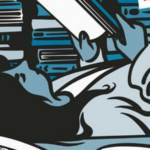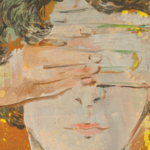Rob Hart and I had plans to sit in a West Village café and talk about ending his private eye series featuring PI Ash McKenna and the juggernaut his new book The Warehouse has become: movie rights signed by Imagine Entertainment with Ron Howard possibly directing; selling rights at the London Book Fair in 17 countries. But even an up-and-coming author of this stature can’t control the weather, and there was a summer downpour right as I reached the café. Rejecting the inside for being too noisy, we scampered in the rain a few blocks to a quiet place where Hart knew the bartender.
I’ve drunk whiskey with Hart before, but not since the astounding pre-publication reviews and accolades for The Warehouse appeared. The book is sui generis. At the center is a company called Cloud, “the solution to every need” (around the time I started the book I was spending time in Silicon Valley and it was an unpleasant, uncanny feeling). Cloud offices are live/work spaces like an old-time company town rebranded as compounds. There are three central characters: Paxton, a former prison guard who is assigned to security; Zinnia, a specialist in corporate espionage working at the actual warehouse as a picker; and Gibson, the dying founder of the Cloud, who is narrating the origins of the Cloud as he is doing a farewell tour of the enormous capitalist machine he has built.
Lisa Levy: It’s not quite life-after-the-book yet but tell me about it. I always think this is a very interesting time: after a writer finishes a big book and before the book comes out. I’m curious as to how are you’re feeling about it. How’s your life changed already?
Rob Hart: In some very big ways. I quit my job and I’m writing full time now. It’s given my family a level of security that is really exciting to have. There’s a lot of anxiety too because now it’s on such a different level that you feel like you have to live up to something, and that can be a little hard sometimes. I’ve got this incredible team at Crown that is working so hard for me and I don’t want to let them down. I actually forced myself this past weekend to just sit down on Saturday and just watch a movie instead of sitting on my laptop writing guest posts.
LL: Is this book crime fiction?
RH: In my head it’s still crime fiction because there’s there there’s a drug ring and there’s corporate espionage and there’s an overarching mystery to the whole story.
You know what crime fiction tends to evoke is very much on the street level whereas there’s a mix of a lot of stuff here that’s coming from a higher level. Look at the heroin crisis for example. If you trace that all the way back to the genesis it was pharmaceutical companies who were asking doctors to prescribe opioids and were squashing the thoughts about their different nature. And that sort of exploded to where we get tons and tons of street crime and tons and tons of people using drugs. It was really because a bunch of rich assholes wanted to be rich.
At the end of the day a book has a social conscience. I would argue that The Great Gatsby is a crime novel.
LL: I did argue the Great Gatsby is a crime novel.
RH: There we go. It’s about a gangster and it revolves around his murder. That’s very much a crime.
And at the end of the day everything’s a mystery. You don’t know what the ending is, but technically everything is a mystery if it’s not in the nonfiction section. Genre labels are kind of funny. I’ve been thinking about this a lot as I’ve been in this sort of speculative sci-fi whatever space.
LL: How was writing The Warehouse different from writing the Ash books?
RH: In the Ash books you have this continuity. That’s not just because of Ash but because of the other characters. I’ve always really enjoyed having a sandbox to play in and being able to set the parameters of my sandbox and then with The Warehouse the sandbox is just a little bit bigger.
LL: Okay so we’re gonna go with that analogy. What kind of sandbox is The Warehouse?
RH: That’s an interesting question. I wanted this to be a more socially conscious group of characters that was not like the Ash books, where we’re almost intimate in the sense that we’re about this dumb kid being an adult—
LL: Whereas suddenly you have a really strong sense of social justice running.
RH: For this I was more interested in taking a kneecap off of capitalism which is a much bigger thing to go after than just sort of like a personal journey of discovery. But you know it was the first time I really wanted to write a book that was about a social issue and a little bit less about the people who were finding their way through it.
LL: How would you encapsulate this social issue? Because I can actually think of like 10 different social issues in the book.
RH: That you’re working when capitalism is bad. But that’s the easy one. To my mind we’ve got two really big issues. One is that you’ve got to this point where corporations now treat us like a disposable products because they need us to grow bigger. And that’s a really bad thing. But we’ve also been gaslighted into accepting this system where someone says, “Well at least you have a job.” Yes. And a lot of people have jobs that really suck.
LL: Like, shouldn’t people be happy to have a job even if that job is really shitty?
RH: But we have, in fact, shitty repercussions on the world. It’s like the this this whole idea like I know people who are afraid to take their vacation days because they feel like they might miss something or they might look like they’re not loyal to their employers or they feel obligated to check your email on the weekend. That ethos is new.
People were allowed to have weekends. It just felt like we were getting to this place that is really insidious in that this system is so big and so complicated. You can’t even fix it at this point. Why don’t you tear the whole thing down and start from scratch? I don’t know. I mean I don’t have an answer. I’d be excited if people read the book and were a little bit more mindful of their economic impact. The thing that keeps on coming up and that makes me really happy is people who say, this is making me reconsider how I shop for things, how I track the economy. That’s all I could have asked for.
LL: And I think a lot of that is in Gibson. The Gibson story is in some ways the most insidious part of the book. Have you ever seen “A Face in the Crowd” with Andy Griffith? It’s about a populist hero very much in the same vein as Gibson.
RH: I’ll tell you that I cracked that voice after I read Sam Walton’s autobiography because this is a guy who was like that. The book is like a joke. It was a great read. But this whole book is, ‘you know we went down there and worked real hard and we got the job done because we’re a family.’ And this is the same guy who, when the federal government passed the minimum wage, split up his company again so that he wouldn’t have to pay any of his employees the minimum wage, which sounds like a shitty thing to do to your family.
LL: Have you ever read Constance Rourke? She was an anthropologist in the 1920s and 1930s. Her subject was American humor. She decided that Americans humor didn’t come from the cities it came from rural people telling their own story in certain ways. Her book American Humor is fascinating. It’s just that her premise was so radical. That’s what the Gibson section reminded me of. American humor is humor that appeals to the lowest common denominator.
RH: I think in a lot of a lot of ways the book didn’t totally work until I had been there, because the Cloud is so big such a humongous presence that it almost needed a voice. It needed to be a character. So I placed Gibson in a position where he can sort of litigate his history and the company’s history. I think that opened up the narrative in a way that really made it clear.
LL: It’s interesting that you didn’t have him in the first few drafts.
RH: I had this idea in 2012 and I’ve been taking notes on it since then. My first book didn’t even come out until 2015. But it was always something that I would start working on, and then it wasn’t working, and I would move on to something else that I would get back to and it wasn’t working, and I was on to something else, and I was always at least passively working on it. So it got to a point where that third voice clicked in my head. I always had Paxson; I knew that he was the linchpin. But when I got to Gibson it was like, “Oh it’s like this whole thing makes sense for me now. I got it.”
LL: I found Paxson to be an angry person.
RH: I thought he was kind of sweet because at the end of the day he’s not a bad person. He’s just been trampled down by the system.
LL: But that rage makes him very dangerous. That’s the rage of neo-Nazis and Trump supporters.
RH: I don’t know if I would take him that far but because I think he is a fundamentally good person.
You know we all get convinced that the best ideas rise to the top in the American dream. Things have not gone his way.
LL: That’s why I feel like there’s a lot of anger in him.
RH: That’s interesting. For the record I do not necessarily agree. I don’t see him going that far. I know that men are super fucking dumb and insensitive. Masculinity in general, it’s toxic.
I do feel like it’s a peculiarly American thing to depreciate yourself in the in the eyes of a superior.
Especially now, when a lot of people are being told if you’re a white dude you have a lot of privilege so you’re fine, we don’t need to worry about you. And a lot of people think, well I don’t feel very privileged because I can’t make ends meet or I’m not doing as well as I thought I would. I don’t think that’s necessarily correct. It’s always way more complicated than that.
I just figured that there’s a lot of anger right now because it’s partially a messaging issue and it’s partially that people are just scared and angry—
LL: And some people are very fundamentally bad.
RH: But some people are just misguided. And it’s a rough time for everyone right now. This country is not really in the best place. And it seems to be getting worse and scarier every day.
LL: One of the other themes I noticed which I thought was really interesting was about the corporate takeover of private life. In the last two or three months I’ve read three or four books about this. The new Ruth Ware book is a twist on the Turn of the Screw. But it’s about a smart house. I thought it was very smart. I liked the idea of a nanny being trapped in a smart house. It’s very poignant. People talk about the nanny state as the nanny state is not actually what we have to worry about.
RH: Yeah. We have to worry about the smart house a lot more. I think it all kind of feeds into this idea that we’ve sort of been happy to give up our freedom in the name of convenience. I have an Apple Watch which means there is probably in some server somewhere there is a map showing everywhere I’ve been wandering, a state which is kind of terrifying to think about.
LL: Do you know Jeremy Bentham’s idea about the panopticon? It’s in Foucault’s Discipline and Punish.
RH: Look I’ve been disciplined and punished.
LL: Yeah but this is the thing: even in New York you go outside now and you’re gonna be caught on so many cameras and everyone’s going to know. New York and London.
RH: London is really crazy. You know it’s convenient, it’s easy. And so what do you do? If you want to live a life where you’re not being touched by that; if you want to live a life where you’re just a happy consumer. You know there’s no way to really opt out. You need a cell phone, you need a credit card, you need all these things.
LL: You’re from New York, right?
RH: Yeah I had a funny upbringing. My family didn’t have a lot of money growing up: my dad’s a New York City firefighter. My mom worked in the bowling alley and they always worked their ass off for us. They sent me to a private high school because they thought the education would be better, which it was. They worked really really hard to do that. And so I was one of those kids that like didn’t have the cool shoes or the cool backpack, right? But there were some very wealthy kids there and that was really my first introduction to there’s a whole other side to life. You know when I was in high school obviously I was like, “Oh well, I’m not as cool as that.”
And looking back on it now I have the wisdom to realize they were actually a bunch of entitled assholes.
LL: How can you compare the last couple of years to the four or five years before that? I mean when you first started writing Ash did you envision a future that’s like the world you’re living in now?
“If I were to find out this was all an elaborate prank, I would be really upset but I would not be surprised.”RH: Well I mean when I was writing the first one I felt like it was a million dollar book. And it was published by a small press, and that’s where it should have been published. In retrospect I understand and accept that. That was the level I was writing to. I wasn’t ready for prime time yet. So part of writing the Ash series was about finding my process and learning who I was as a writer. I mean I never for a second thought that The Warehouse would do as well as it did. I figured maybe it would go to a big five publisher, maybe things would go a little bit better. And this has been just completely unexpected. If I were to find out this was all an elaborate prank, I would be really upset but I would not be surprised.
LL: What would you want for your next book.
RH: I am currently working with my editor on the pitch. We’re almost there. I don’t want to talk too much about it but I do want to say that I really like playing in this sandbox now of looking at an issue. The Warehouse is very anti-big-business. The next one is very anti-government. If it was successful at the same level as The Warehouse I would be super excited. I think what The Warehouse bought me more than anything was a little bit of breathing room. Because when I was writing Ash there was this pressure where there was one year I had to produce. I was carrying those out really quickly and it got to a point where it was overwhelming.
I think it’s fascinating that that’s what we expect from our younger writers. They let Jonathan Franzen have eight years. I think there’s this sense that the literary writer’s a bit more of an artist whereas the genre writer is a bit more like a workhorse. Like you’re just churning them out.
LL: Which is obviously a ridiculous designation.
RH: I want to spend time with my kid. So you shouldn’t ask me to be chained to a computer the entire time.
LL: What makes this book so interesting and so powerful is that the company at the center of it is both familiar and fiction.
RH: You know it occurs to me that that is actually the power of fiction. It was really it was very deliberate in the sense that I wanted everything in this book to feel familiar. Like whenever I felt like I was going too far straight into the sci-fi stuff with the technology I pulled it back. Because I thought that this book would resonate with people way more if it was stuff that you understood and were familiar with. Look, if you write about lasers, no one knows how a laser gun works because we don’t have laser guns like that. That’s not a helpful analogy. But if you write about a tracking device. Everyone knows we’re wearing tracking watches. One of the things I’ve benefited from is that people are now coming around to noticing the stuff.
It’s a timing thing. I had a conversation with a friend recently who said five years ago this book wouldn’t have worked. It would have been relevant but it wouldn’t have worked because people wouldn’t have been as cognizant of it. I think that is absolutely true. I think that we’re now getting to a place where people are catching on. It was just the right time for this book.

















